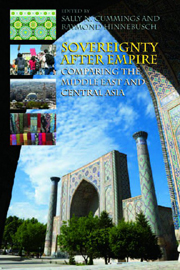Book contents
- Frontmatter
- Contents
- Acknowledgments
- Notes on the Contributors
- 1 Introduction
- SECTION I Histories of Empire and After
- SECTION II Paths to Sovereignty: Views from the Core and Periphery
- SECTION III Empire and Domestic Sovereignty
- SECTION IV Empire and Popular Sovereignty
- 10 Culture, Colonialism and Sovereignty in Central Asia
- 11 Culture in the Middle East: The “Western Question” and the Sovereignty of Post-imperial States in the Middle East
- 12 Pathways of Islamist Mobilization against the State in the Middle East and Central Asia
- SECTION V Empire and External Sovereignty
- Bibliography
- Index
11 - Culture in the Middle East: The “Western Question” and the Sovereignty of Post-imperial States in the Middle East
from SECTION IV - Empire and Popular Sovereignty
Published online by Cambridge University Press: 12 September 2012
- Frontmatter
- Contents
- Acknowledgments
- Notes on the Contributors
- 1 Introduction
- SECTION I Histories of Empire and After
- SECTION II Paths to Sovereignty: Views from the Core and Periphery
- SECTION III Empire and Domestic Sovereignty
- SECTION IV Empire and Popular Sovereignty
- 10 Culture, Colonialism and Sovereignty in Central Asia
- 11 Culture in the Middle East: The “Western Question” and the Sovereignty of Post-imperial States in the Middle East
- 12 Pathways of Islamist Mobilization against the State in the Middle East and Central Asia
- SECTION V Empire and External Sovereignty
- Bibliography
- Index
Summary
The “Western Question”
To those living in the Middle East the Eastern Question became a “Western Question” – how to deal with intrusive Europe while coping with the everpresent perils and prospect within the region itself … should we Middle Easterners seek to gain needed strength by adopting Western ways that have produced powerful states in Europe and North America? Or does our salvation lie in resisting alien ways and returning to our own religious and cultural heritage? … Should we rally around the existing states ruling over us? Or should we seek a new political community with either different borders or different organisational principles (if not both). If so, should that new state be based on religion, ethnicity, or language?
In the broader discussion of this volume on “sovereignty after empire,” this chapter turns attention to the impacts of imperialism on the Middle East as they are related to culture. While references both to culture and an imperial(ist) legacy frequently appear in discussions on the Middle East, both terms are also highly contested. Culture may refer to a “bar” dividing humanity or a “bond” uniting it, so that instead of speaking of a “world of cultures” we should refer to a (emerging) “World Culture” in the singular. Similarly, an “imperial legacy” may refer to the impact of European imperialism or the influence of successive Islamic empires.
This diversity of meanings is also reflected in the Western academic literature on the contested nature of the post-imperial states and the salience of the sovereignty institution in the Middle East.
- Type
- Chapter
- Information
- Sovereignty after EmpireComparing the Middle East and Central Asia, pp. 222 - 241Publisher: Edinburgh University PressPrint publication year: 2011

